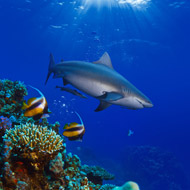
Finding paves way for treatment of tooth loss
A network of genes help sharks to grow new teeth throughout their lifetime, a study by the University of Sheffield has found.
It has long been known that sharks and rays develop rows of highly specialised teeth with the capacity for lifelong regeneration. But the genetic mechanisms which allow this to happen were not previously understood.
Now researchers have identified how a special set of epithelial cells form, which are responsible for the lifelong continuation of tooth development and regeneration in sharks. Humans also have these cells, but only two sets of teeth are formed before this set of specialised cells run out.
Scientists say that the finding could pave the way for the development of therapies to help with human tooth loss.
Dr Gareth Fraser from the University of Sheffield said: “We know that sharks are fearsome predators and one of the main reasons they are so successful at hunting prey is because of their rows of backward pointing, razor-sharp teeth that regenerate rapidly throughout their lifetime, and so are replaced before decay.
“The Jaws films taught us that it’s not always safe to go into the water, but this study shows that perhaps we need to in order to develop therapies that might help humans with tooth loss.”
In the study, researchers characterised the expression of genes during the formation of teeth in catsharks. They found that the genes take part in the vital emergence of shark’s teeth and are redeployed for further tooth regeneration.
Through their investigation, the researchers show that tooth-making genes in sharks are conserved through 450 million years of evolution and probably made the first vertebrate teeth. But in mammals like humans, the tooth regulation ability that utilises these genes has been highly reduced over time.
Furthermore, the study indicates that at the beginning of the sharks’ evolutionary history, their teeth most likely continually regenerated and used a core set of genes from members of key developmental signalling pathways. These were instrumental in sharks evolving to maintain the ability to redeploy the genes to replace teeth when needed.
The study - An accidental dental gene set governs development and continuous regeneation of teeth in sharks - is published in Developmental Biology



 The BSAVA has opened submissions for the BSAVA Clinical Research Abstracts 2026.
The BSAVA has opened submissions for the BSAVA Clinical Research Abstracts 2026.